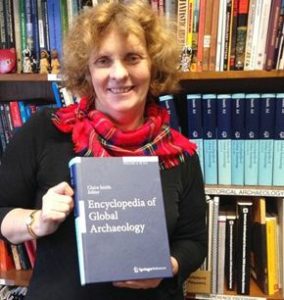 It was a 60-pound baby with a six year gestation, but the Encyclopedia of Global Archaeology, edited by Flinders University’s Professor Claire Smith, is safely on the shelf.
It was a 60-pound baby with a six year gestation, but the Encyclopedia of Global Archaeology, edited by Flinders University’s Professor Claire Smith, is safely on the shelf.
While the 11-volume Encyclopedia’s raw statistics are impressive enough – 1625 entries by 1329 authors – Professor Smith (pictured) says the reference work’s greatest innovation and point of difference is the inclusion of entries by non-English speaking archaeologists.
As editor, Professor Smith encouraged contributors to submit in their own languages, before being translated and edited into high standard academic English.
The translated authors included senior archaeologists from countries such as Russia, Turkey, Japan and China as well as from countries in South America and Africa.
“There’s a whole lot of new information that hasn’t been available in English before,” Professor Smith said. With the inclusion of author biographies, she said the book represents the most comprehensive resource on world archaeology ever available.
The entries range from the brief and specific up to thematic entries of up to 10,000 words.
With peer review for each entry as part of the process of compiling and editing, the book took almost exactly six years to complete from the day when Professor Smith agreed to take on the task while having lunch with a commissioning editor of Springer, the international academic publisher.
“I’m hoping that it will be definitive for a very long time. People have done thematic encylopedias in archaeology of up to three volumes, but nothing as comprehensive as this,” Professor Smith said.
The book is only complete in one sense: an additional 250 entries have already been commissioned for the online version, and a second printed edition may not be far away.
Professor Smith said that after completing the massive task – in addition to her organising role, she wrote two entries and substantively edited another 300 – she intends to undertake some small-scale writing projects.
“Nonetheless, I loved the sense of legacy and the breadth of vision involved,” she said.
The launch of the encyclopaedia by Flinders University’s Deputy-Vice Chancellor (Research), Professor David Day, was a highlight of the National Archaeology Student Conference held recently at Flinders.
The conference was attended by close to 100 postgraduate and PhD students from archaeology disciplines at universities across Australia.
Conference co-organiser Jordan Ralph, a Flinders PhD candidate, said that as well as enabling students to present their research to their peers, presentations by eminent academics and consultant practitioners provided insights into research strategies and the practical aspects of archaeology as a career.
“The 36 papers covered everything from Egypt to Indigenous archaeology in Australia,” Mr Ralph said.
He said the conference had been a huge success, and while it had been almost a decade since the last national student conference, moves are afoot to hold another as soon as next year.

